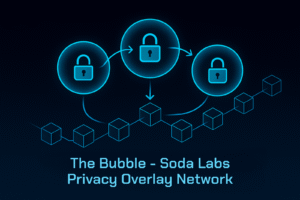Privacy Is Non-Negotiable For DeFi’s Future
The transparency of the blockchain opens traders to a wide range of exploits. Soda Labs’ garbled circuits-based MPC solution offers a flexible, efficient approach to decentralized confidential computing, and supports optional auditing – allowing traders to maintain privacy without sacrificing either performance or compliance.
Five years ago, an article by two white hat hackers confirmed what many experts had long suspected. Ethereum’s transparency, and in particular the transparency of the mempool (the “holding pool” for transactions yet to be confirmed), made the network a playground for MEV bots.
MEV, or Maximal Extractable Value, is a catch-all term (coined in 2019 by the Flash Boys 2.0 paper) for a number of ways in which tech-savvy users can exploit pending transactions, siphoning profit from other users. Trades are front-run, back-run, and sandwich attacked. NFT mints are sniped to grab the most valuable NFTs. Vault liquidation rewards are snatched from those who spot the opportunity first.
MEV pushes up costs for everyone, by increasing slippage, robbing users of opportunities, and adding to overall network gas costs. MEV bots can be highly sophisticated, and almost no DeFi transaction is safe. If it contains information that can be exploited for profit, it will be.
Transparency: The Price Of Doing Business?
Transparency is a core part of open blockchains’ security model, but it brings downsides with it. MEV is only part of the problem. Any information stored on the blockchain is permanently visible.
One issue that has recently been in the public eye is market manipulation. When decentralized exchanges record orders on the blockchain, they leave a trove of information for wealthy entities to exploit. This issue was highlighted recently by the case of a trader who says he was “stop hunted” by a cabal of well-capitalized attackers, who pushed the price of bitcoin down with sell orders and forced $100 million in liquidations.
While claims like this are hard to prove and have to be taken with a grain of salt, we know that transparency enables a wide range of blockchain attacks. One of the most infamous cases took place in 2022, when a crypto trader named Avraham Eisenberg exploited the Solana-based DeFi protocol, Mango Markets, for $110 million.
Eisenberg established a large leveraged long position in MNGO, Mango’s governance token, on the platform. He then manipulated the price of MNGO on the (low-liquidity) open market, driving up its price by around 1,000%. This allowed him to borrow and withdraw a large amount of crypto against the artificially-inflated value of his collateral, before allowing the market to collapse again and leaving the protocol holding the bad debt.
The kicker is that although Eisenberg was convicted of fraud and market manipulation in 2024, the conviction was overturned in May 2025 on the grounds that Mango Markets was a permissionless DeFi platform; while Eisenberg’s manipulation of the MNGO token price was exploitative, it “did not constitute a material misrepresentation [to a human party], which was necessary to sustain a wire fraud conviction”, as the platform’s smart contracts executed trades automatically based on oracle prices.
Essentially, the court agreed that Eisenberg was using the platform within the rules set by its coding.
Dark Pools And Confidential DEXs
Questions of whether “code is law” or “law is law” aside, Web3 adoption will be severely curtailed if such exploits remain as commonplace as they are today.
One solution is the creation of Dark Pool perpetual DEXes, to protect traders from similar exploits, as Binance founder Changpeng “CZ” Zhao has recently suggested. These are private platforms that hide orders from public view until after they have been executed and confirmed on the blockchain. However, dark pools typically cater only to large traders, and risk fragmenting liquidity, making slippage worse on other platforms.
Arguably a better approach is to build optional privacy into existing DEXes, so it benefits all traders.
Soda Labs’ garbled circuits (GCs) offer the ideal way to do this. GCs are a lightweight, flexible solution, suited to any kind of on-chain operation. Unlike fully homomorphic encryption (FHE), they are fast and efficient, and amenable to operate on NIST-standard encryption schemes (e.g. AES). They support “private shared state” (i.e. with inputs from multiple parties and private data that “belongs” to the contract rather than an individual user), unlike ZK proofs, and do not require any custom hardware like FHE and TEEs.
The Best Of Both Worlds
Soda’s solution is available either as a standalone L2 network or a co-processor layer for existing blockchains. Much like Chainlink serves data external to the blockchain to dApps via its oracle network, Soda’s overlay network facilitates confidential transactions of all kinds, everywhere, on-demand.

From the developers’ side, there is no need to learn new programming languages or make changes to the dApp’s code, so there are no significant overheads to adoption. Integrating confidential transactions via Soda’s co-processor Bubble network avoids the need to create completely new platforms, allowing traders to continue using their preferred, familiar interfaces and tooling.
This option would allow users to choose whether their trades are executed transparently on the DEX or via confidential transactions, letting them switch on and off privacy according to their needs. While confidential trades are encrypted, our garbled circuits-based privacy solution allows for selective disclosure of information, to enable traders to maintain compliance if data is requested by third parties (consent from the trader is necessary).
Follow us!
To learn more about Soda Labs’ MPC solution, based on an on-chain implementation of garbled circuits, explore our documentation, join the gcEVM Vanguards Telegram group, or stay up to date with the latest developments by following the project on X.


